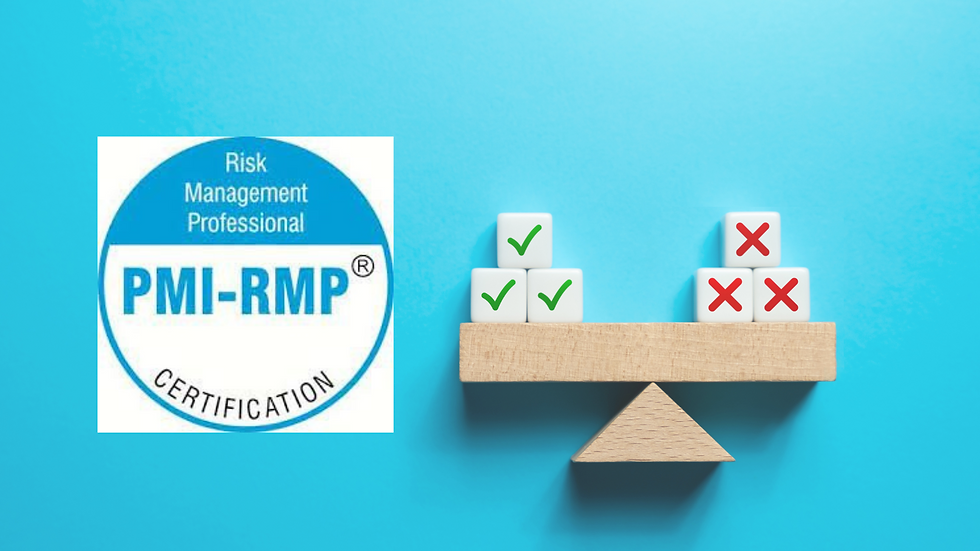RMP Course: Master Risk Management for Project Success
- passyourcert24
- Feb 22, 2025
- 3 min read
In today’s competitive job market, standing out as a project management professional requires more than just experience—it demands recognized certifications. The Risk Management Professional (RMP) course is one such credential that can elevate your career. Whether you're a seasoned project manager or just starting, an RMP certification can open doors to new opportunities and higher earning potential. In this blog, we’ll explore what an RMP course entails, its benefits, and how to choose the best program for your needs.
What is an RMP Course?
The RMP course is designed for professionals who want to specialize in risk management within the field of project management. Offered by the Project Management Institute (PMI), the RMP certification validates your ability to identify, assess, and mitigate risks in projects. This certification is ideal for those who want to enhance their expertise in managing uncertainties and ensuring project success.
The course covers key areas such as risk strategy and planning, stakeholder communication, risk analysis, and monitoring. By completing an RMP course, you’ll gain the skills needed to handle complex projects with confidence and precision.
Why Should You Enroll in an RMP Course?
Boost Your Career Prospects
Employers value professionals who can effectively manage risks, as it directly impacts project outcomes. An RMP certification demonstrates your commitment to excellence and positions you as a trusted expert in risk management.
Increase Your Earning Potential
Certified professionals often earn higher salaries compared to their non-certified peers. According to PMI, RMP-certified individuals can expect a significant salary boost, making it a worthwhile investment.
Enhance Your Skill Set
The RMP course equips you with advanced risk management techniques, tools, and frameworks. These skills are transferable across industries, making you a versatile asset to any organization.
Gain a Competitive Edge
In a crowded job market, having an RMP certification sets you apart from other candidates. It shows that you have the knowledge and expertise to handle high-stakes projects.
How to Choose the Right RMP Course
With so many options available, selecting the best RMP course can be overwhelming. Here are some factors to consider:
Accreditation
Ensure the course is accredited by PMI or a recognized institution. This guarantees that the program meets industry standards and provides relevant, up-to-date content.
Course Content
Look for a comprehensive curriculum that covers all aspects of risk management, including planning, identification, analysis, and response strategies.
Flexibility
If you’re working full-time, opt for a course that offers flexible learning options, such as online classes or self-paced modules.
Instructor Expertise
Choose a program led by experienced instructors with a proven track record in risk management. Their insights and real-world examples can greatly enhance your learning experience.
Support and Resources
A good RMP course should provide additional resources like practice exams, study materials, and access to a community of professionals.
Top Benefits of Completing an RMP Course
Improved Decision-Making
The RMP course teaches you how to assess risks and make informed decisions, ensuring project success even in uncertain conditions.
Better Stakeholder Communication
You’ll learn how to effectively communicate risks to stakeholders, fostering transparency and trust.
Increased Project Success Rates
By identifying and mitigating risks early, you can prevent costly delays and ensure projects are completed on time and within budget.
Global Recognition
The RMP certification is recognized worldwide, making it a valuable credential for professionals seeking international opportunities.
Steps to Get Certified
Eligibility Requirements
To enroll in an RMP course, you’ll need a secondary degree (high school diploma or equivalent) and at least 4,500 hours of project risk management experience. Alternatively, a four-year degree and 3,000 hours of experience will suffice.
Prepare for the Exam
The RMP exam consists of 170 multiple-choice questions and tests your knowledge of risk management principles and practices. Enroll in a reputable RMP course to prepare effectively.
Pass the Exam
Achieve a passing score to earn your certification. Most courses offer practice exams to help you gauge your readiness.
Maintain Your Certification
To keep your RMP certification active, you’ll need to earn 30 professional development units (PDUs) every three years.
Conclusion
Investing in an RMP course is a smart move for any project management professional looking to advance their career. Not only does it enhance your risk management skills, but it also boosts your credibility and earning potential. By choosing the right program and dedicating time to study, you can earn your RMP certification and unlock new opportunities in the field of project management.
Ready to take the next step? Enroll in a top-rated RMP course today and start your journey toward becoming a certified Risk Management Professional. Your future self will thank you!







Comments